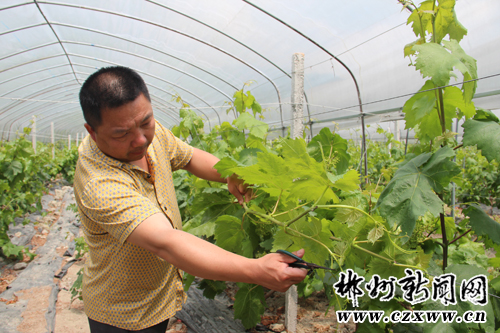Huang Wenbin, the king of fruits and vegetables in eastern Guangxi, never forgets his fellow villagers when he gets rich.

He used to be an ordinary migrant worker, supporting his family on a meagre income. Now, when he returns to his hometown to start a business, he has not only founded the company and set up an ecological vegetable cooperative. He has also obtained 5 inventions and 11 patents, and was named "Top Ten Entrepreneurship Youth in Eastern Guangxi" in 2015. He is Huang Wenbin, the "Fruit and vegetable King" who led 110 farmers to become rich in Zhaiqian Town, Guidong County.
In the fruit and vegetable base of the Fuzhu Ecological vegetable Co-operative in Zhaiqian Town, neat rows of red trees are covered with red lifts, and Huang Wenbin and his wife are pruning the branches and leaves of the trees.
In 2008, due to the impact of the financial crisis, Huang Wenbin, a migrant worker in Jieyang, Guangdong Province, returned to his hometown and embarked on his own entrepreneurial road.
When Huang Wenbin returned to his hometown, he found that the price of vegetables in eastern Guangxi was relatively high. by communicating with vendors, he learned that most of the vegetables in eastern Guangxi were imported from other places, so he wrote a report and submitted it to the local government, hoping to develop vegetable cultivation. The idea of growing vegetables was affirmed by relevant departments. Huang Wenbin participated in the training of the first batch of new professional farmers in Chenzhou and co-founded Guidong County Shanliqing Modern Agricultural Science and Technology Development Co., Ltd. In March 2011, Huang Wenbin began to try to grow chili peppers, but the chili peppers did not sell well due to lack of technology and experience. Wholesalers feel that pepper varieties are too single to refuse to buy, covering an area of 200mu nearly 900000 jin of pepper has been unsalable, a direct loss of more than 700,000 yuan.
Full of enthusiasm was poured a bucket of cold water, but Huang Wenbin is not discouraged, in order to diversify the variety of fruits and vegetables, set up an ecological professional cooperative in 2011. When it was first established, the villagers did not trust the co-operatives and took their own vegetables of good quality to the market to sell at high prices, leaving leftovers to be sold to the co-operatives. In order to win the trust of the villagers, Huang Wenbin went to the villagers' homes again and again to communicate, and taught them some of his entrepreneurial experience to help the villagers sell things. With the development of the co-operatives getting better and better, there is no longer a backlog of things, money has been earned, and the villagers are finally relieved.
However, Huang Wenbin was not satisfied with this. he led the team to study constantly, overcome one difficulty after another, and finally obtained 11 patents, such as watermelon pressure, ginger sprouting, and five inventions in the cultivation of fruits and vegetables, making the planting method more scientific and technology. labor costs have also been gradually reduced, and the output and quality of fruits and vegetables have been continuously improved. For example, the yield of ginger has changed from 2000 jin per mu to 8000 jin per mu, and the villagers are happy.
"the government has given a lot of support to my business, not only giving us facilities to help build greenhouses, but also regularly organizing training in the cultivation of fruits and vegetables, which is really good for me!" Huang Wenbin said with a smile.
Now the cooperative has a vegetable base of 630 mu, absorbing 110 farmers in the county, including many poor families. In order to help the villagers get rich together, Huang Wenbin discussed with the cooperative and decided to send free fertilizers, seeds, seedlings, etc., to the poor villagers. The cooperative also regularly organized training for the villagers, growing fruits and vegetables, base management, and product acquisition.
- Prev

The "Blueberry Queen" led the villagers to get rich and the farmer aunt bought a car.
The "Blueberry Queen" led the villagers to get rich and the farmer aunt bought a car.
- Next

Two "post-80s" propped up the villagers'"getting rich umbrella" with Lentinus edodes.
Two "post-80s" propped up the villagers'"getting rich umbrella" with Lentinus edodes.
Related
- A course of planting techniques and methods on how to grow carrots
- How to plant the latest tulips?
- Is it better to pick tea in the morning or in the afternoon? When is the best time for tea to be picked? what is the third or fifth tea?
- Launch Yuanxiao Happy combination Haocha + Tea Yuan healthy Taste
- Penghu Tourism "Fireworks 20 Parade with You"
- 2022 West Lake Happiness holds "Digital Revitalization Voucher" and draws iphone13 and laptop.
- Banqiao Fuzhou social houses are designed to change start-up combined with police elimination to create a safe and livable environment
- The convenient measure of "mechanical weeding" in Xinbei has been abused and the Agriculture Bureau has imposed heavy penalties on the illegal land consolidation.
- Changgeng University Joins Hands with Four Memory Factories to Rescue Memory Talent Shortage
- The list of Taiwan's top 100 MVP managers is listed by the Director-General of the Farmers' Association of Sanxia District.

